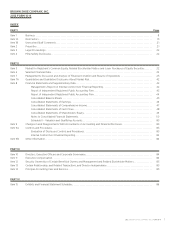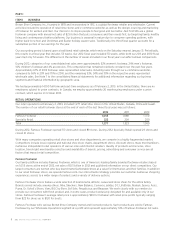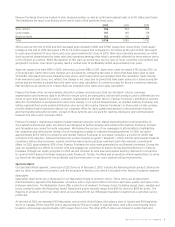Famous Footwear 2012 Annual Report Download - page 19
Download and view the complete annual report
Please find page 19 of the 2012 Famous Footwear annual report below. You can navigate through the pages in the report by either clicking on the pages listed below, or by using the keyword search tool below to find specific information within the annual report.2012 BROWN SHOE COMPANY, INC. FORM 10-K 17
We are reliant upon our information technology systems, and any major disruption of these systems could adversely impact
our reputation and our ability to eectively operate our business.
Our computer network and systems are essential to all aspects of our operations, including design, pricing, production,
forecasting, ordering, manufacturing, transportation, sales and distribution. Our ability to manage and maintain our
inventory and to deliver products in a timely manner depends on these systems. If any of these systems fails to operate as
expected, we experience problems with transitioning to upgraded or replacement systems, a breach in security occurs or a
natural disaster interrupts system functions, we may experience delays in product fulfillment and reduced eciency in our
operations or be required to expend significant capital to correct the problem, which may have an adverse eect on our
results of operations and financial condition.
A disruption in the eective functioning of our distribution centers could adversely aect our ability to deliver inventory
on a timely basis.
We currently utilize several distribution centers, which are leased or third-party managed. These distribution centers serve
as the source of replenishment of inventory for our footwear stores operated by our Famous Footwear and Specialty Retail
segments and serve our Wholesale Operations segment. We may be unable to successfully manage, negotiate or renew our
third-party distribution center agreements, or we may experience complications with respect to our distribution centers,
such as substantial damage to or destruction of such facilities due to natural disasters or ineective information technology
systems. In such an event, our other distribution centers may not be able to support the resulting additional distribution
demands and we may be unable to locate alternative persons or entities capable of fulfilling our distribution needs, resulting
in an adverse eect on our ability to deliver inventory on a timely basis. While we maintain business interruption insurance,
it may not adequately protect us from adverse eects caused by significant disruptions in our distribution centers.
Foreign currency fluctuations may result in higher costs and decreased gross profits.
Although we purchase most of our products from foreign manufacturers in United States dollars and otherwise engage
in foreign currency hedging transactions, we cannot ensure that we will not experience cost variations with respect to
exchange rate changes. For example, although we purchase footwear made in China using United States dollars, Chinese
manufacturers have been increasing their United States dollar prices to compensate for the appreciation of the Chinese
currency against the United States dollar. Currency exchange rate fluctuations may also adversely impact third parties who
manufacture the Company’s products by making their purchases of raw materials or other production costs more expensive
and more dicult to finance, resulting in higher prices and lower margins for the Company, its distributors and licensees.
Additional duties, quotas, taris and other trade restrictions may be imposed on our foreign sourced products,
adversely aecting our sales and profitability.
Our foreign sourced products are subject to duties collected by customs authorities when imported to the United States
or other countries. We cannot predict whether additional customs duties, quotas, taris, anti-dumping duties, safeguard
measures, cargo restrictions or other trade restrictions may be imposed on the importation of our products in the future.
Such additional charges may result in increases in the cost of our products and may adversely aect our sales and profitability.
Our business, sales and brand value could be harmed by violations of labor, trade or other laws.
We focus on doing business with those suppliers who share our commitment to responsible business practices and
the principles set forth in our Production Code of Conduct (the “PCOC”). By requiring our suppliers to comply with the
PCOC, we encourage our suppliers to promote best practices and work towards continual improvement throughout their
production operations. The PCOC sets forth standards for working conditions and other matters, including compliance
with applicable labor practices, workplace environment and compliance with laws. Although we promote ethical business
practices, we do not control our suppliers or their labor practices. A failure by any of our suppliers to adhere to these
standards or laws could cause us to incur additional costs for our products, could cause negative publicity and harm our
business and reputation. We also require our suppliers to meet our standards for product safety, including compliance with
applicable laws and standards with respect to safety issues, including lead content in paint. A failure by any of our suppliers
to adhere to product safety standards could lead to a product recall, which could result in critical media coverage, harm our
business and reputation and cause us to incur additional costs.
In addition, if we, or our suppliers or foreign manufacturers, violate United States or foreign trade laws or regulations, we may
be subject to additional duties, significant monetary penalties, the seizure and forfeiture of the products we are attempting
to import or the loss of our import privileges. Possible violations of United States or foreign laws or regulations could include
inadequate record keeping of our imported products, misstatements or errors as to the origin, classification, marketing or
valuation of our imported products, fraudulent visas or labor violations. The eects of these factors could render our conduct
of business in a particular country undesirable or impractical and have a negative impact on our operating results.
We face additional risks relating to operating manufacturing facilities in China.
We operate manufacturing facilities in China. These manufacturing facilities are subject to many of the same risks as our
third-party foreign sourcing arrangements, described above, but we may be more directly impacted by any negative
























